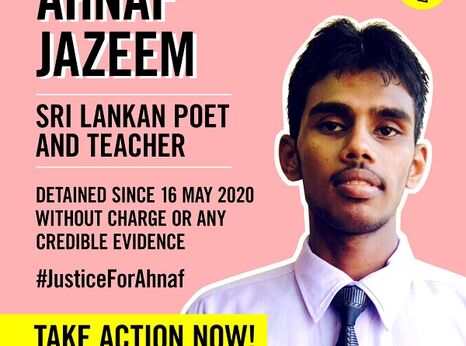Sri Lanka: Poet detained for one year without charge

Ahnaf Jazeem, a Sri Lankan poet and teacher, was arrested by the Terrorism Investigation Department (TID) on 16 May 2020, under the draconian Prevention of Terrorism Act (PTA). He was arrested in connection to a Tamil-language collection of poems he published under the title Navarasam, as well as other unsubstantiated claims of exposing his students to ‘extremist’ content and ideology.
Ahnaf did not have any legal representation close to eight months since his arrest. After securing a legal counsel, he was permitted access to his lawyer only on 8 March 2021—after two months of continuous appeals by his lawyer. Even then, his meeting with his lawyer was monitored with officers of the TID listening in and recording their privileged conversations. According to his lawyer, while in detention, Ahnaf was also made to sign documents written in a language he doesn't understand. Authorities have attempted to get him to make self-incriminating, forced confessionary statements. Denied access to his family for close to five months since his arrest, he continues to be denied unrestricted and regular access to family. According to his lawyer, Ahnaf has been subjected to inhuman and degrading treatment while in detention and had been kept in unsanitary conditions. On 16 March 2021, his lawyer also wrote to the Human Rights Commission of Sri Lanka (HRSCL) about the violation of Ahnaf’s fundamental rights, due process, and inhuman and degrading treatment.
The arrest of Ahnaf comes amidst the background of increased marginalization, discrimination and targeting of Sri Lanka’s Muslim community. Amnesty International has recorded recent incidents of cabinet proposals, decisions, and government regulations that from the outset discriminate against the country’s Muslim minority community which make up approximately 9% of Sri Lanka’s population.
In 2017, then UN Special rapporteur on the promotion and protection of human rights and fundamental freedoms while countering terrorism, Ben Emmerson, highlighted the history of Sri Lankan authorities of prosecuting minorities on charges of terrorism, noting that “the Prevention of Terrorism Act had been used to commit some of the worst human rights violations, including widespread torture and arbitrary detention, in the run-up to and during the conflict, particularly to target minorities and suppress dissent”. The report also highlighted the history of Sri Lankan authorities persecuting individuals under terrorism related law with “various real or perceived links or associations with armed groups, and detaining for years without charge or trial, without any judicial review of their detention, and with almost no possibility of release”.
The Human Rights Commission of Sri Lanka (HRCSL), in its 2016 submission to the UN Committee against Torture, highlighted the use of torture within Sri Lankan context with “torture being routinely used in all parts of the country regardless of the nature of the suspected offence for which the person is arrested.” A more recent prison study done by the HRCSL, published in December 2020, found that PTA detainees faced a continuum of violence. The study found that “violence in police custody was found to be an inherent element of the investigation process, whereby torture is inflicted to extract information, confessions and evidence from detainees.